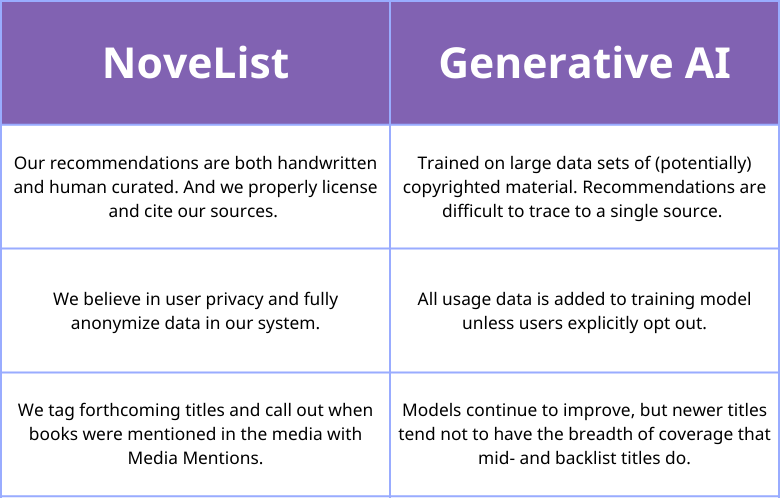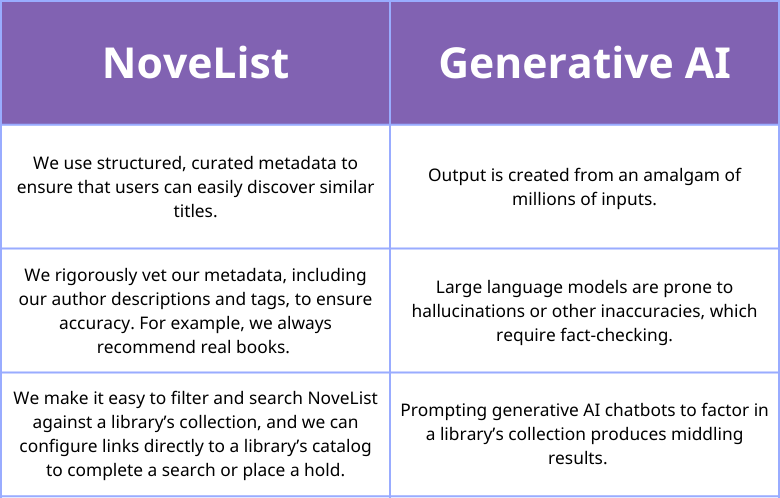It’s nearly impossible to go a day without seeing generative AI in the headlines. ChatGPT and other AI chatbots like Microsoft’s Copilot, Anthropic’s Claude, or Google’s Gemini are widely discussed and used today. It’s a certainty that staff in libraries around the world are using these technologies, whether their libraries have adopted formal AI policies governing their use or not (and I strongly recommend that you do!).
I use AI tools daily to summarize meeting notes, locate documents, and extract key points from long-form articles. They’ve saved me hours a month, allowing me to focus on other, higher-impact work.
However, as with any tool or technology, there can be a danger in using AI to solve every problem. AI is simply not a perfect fit for some use cases, and this is particularly true for something near to our hearts at NoveList: Book recommendations.
The problem with using AI for book recommendations
While libraries offer so much to their communities, books and customer service are both central to a library’s brand. When you hand-sell just the right book to the right person, it can be a fantastic and fulfilling experience. Connecting a library patron with a great recommendation is a chance to offer great customer service and emphasize the amazing collections libraries have built on behalf of their communities over the years.
However, I know from experience that life at the desk can be frantic. I used to be the sole reference librarian in a small library. It can be a uniquely stressful experience knowing you could get a question about literally anything, and readers' advisory questions are simply one of many questions you might receive that day. Many users don’t have the time to sit down and dig in, so you may only have a few moments to pitch a book. Without the right training or resources, it can be tempting to reach for a quick answer to keep the line moving.
Imagine someone working the circulation desk of your local public library (probably not a stretch for many readers of this blog). A library patron approaches this individual for a suggestion, and they rattle off the names of some books and authors the circulation staff member has truly never heard of. Given the queue forming at the desk, maybe this person gives into the temptation and runs a quick search or two in ChatGPT. After all, AI chatbots deliver shockingly quick, confident answers to prompts.
In my experience, what seems like a nice, cohesive AI response actually requires a bit of work to unpack and fact-check. Without experimentation and clarifying the right prompts, ChatGPT tends to over-index on bestsellers and award winners—often the titles that most readers don’t need help finding. While more recent models are closing this gap, recommendations are not always up to date on the latest books/publishing trends, so it’s less reliable for titles published in the last few years. It’s also unclear where the recommendations come from, since these complex large language models are often trained on so many data sources. What’s more concerning, generative AI tools can "hallucinate," creatively fudging facts by generating an amalgamation of books and titles that don’t technically exist.
Even when ChatGPT suggests real titles, it’s not apparent that every title it recommends is a solid choice. Without a strong foundation in the genres involved, staff members simply need to trust that the recommendations are high quality and accurate. It’s also difficult to force ChatGPT to only recommend books in the library’s collection. These are all serious concerns: Both the quality and availability of the recommendation can be a deciding factor between whether a patron considers a return visit or goes elsewhere.
How to match readers with books quickly, without the use of AI
The good news here is that NoveList Plus still supports that quick response you need at the desk. Imagine if the library staff member jumped into NoveList Plus instead. It’s easy to quickly search for the last title or author a reader loved and print out a list of read-alikes for the user to take with them. If you have a few extra moments, you can use our unique reasoning language to explain precisely why a reader would enjoy a title.
NoveList Plus also does a great job connecting users back to the library catalog. We offer several features that make it easy to search against titles that are in a library’s collection, see what’s available, and link back to the catalog to place a hold or check out an eBook. We want to ensure that our users can confidently recommend a book within seconds at the desk, and trust that the recommendation was curated by book experts.
While many generative AI models are trained on a wide breadth of data, NoveList Plus is built and maintained by professionally active experts. Our recommendations are human-centered. Many are hand-written by a library or other book professional, which means you can always trust our subject knowledge and expertise. We have editorial standards, and we work hard to use the latest terminology and to keep up with current trends in publishing. These are just a few reasons NoveList continues to be a part of a library’s toolkit for serving readers.


Please don’t take my word for it. If you have access to NoveList Plus, try us out. If you don’t, please reach out for a demo. If you’re using generative AI for reader services, please reach out. I’d love to learn more about what is working for you (and what isn’t).
Sam Stover is Senior Product Manager at NoveList. He is currently reading A Psalm for the Wild-Built by Becky Chambers.



